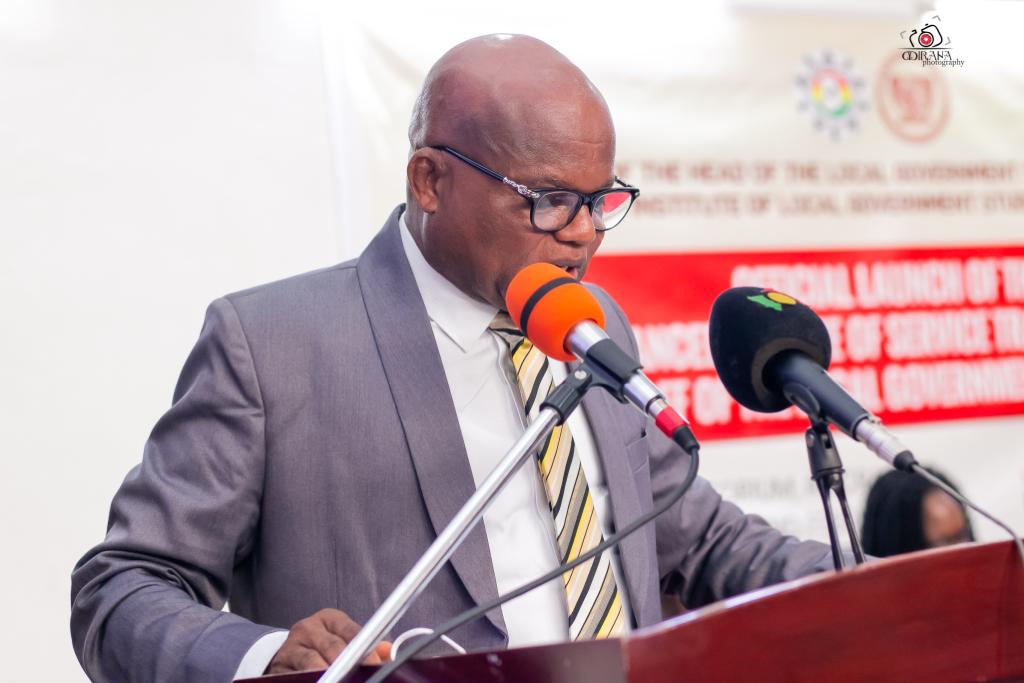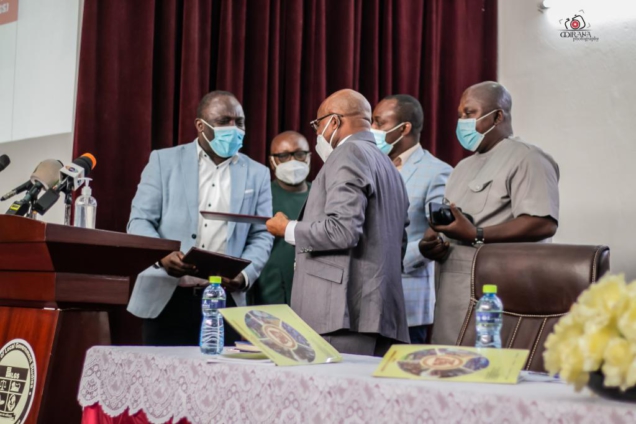The Office of the Head of Local Government Service (OHLGS) has partnered the Institute of Local Government Studies (ILGS) to launch the Enhanced Scheme of Service Training (SoST) Programme for staff of the various job classes within the Local Government Service.
The programme, according to local government experts, is geared towards the operationalisation of a robust local government service sector that addresses needs of the citizens.
It is intended to introduce a more structured, coherent and career-oriented capacity-building intervention for the professional staff of the LGS while providing an opportunity to establish common value systems among staff for improved service delivery and local level development.
In a speech read on his behalf at the launch, the Local Government, Decentralisation and Rural Development Minister, Daniel Botwe commended the OHLGS and the ILGS for recognising the importance of working together to develop the proggramme.
According to him, the SoST programme will prepare LGS staff to meet the demands of their services and give them the knowledge, skills, and competencies to reach new career heights.
“In addition to learning contemporary public management practices, insights, and trends, you will examine yourself as a leader, explore your strengths and challenges, develop a leadership philosophy and greater leadership presence, and deepen your emotional intelligence. Through your participation in the programme, your greatest potential will be tapped, and you can expect both professional and personal development,” he noted.
The Minister further pledged government commitment to ensure that the programme is a success.
“The Government of Ghana is committed to the programme particularly for its coverage of the legal and contextual basis. To this end, it is envisaged that programme implementation would be sustainable and should attract funding from Government sources and development partners as well as private sector and individuals.”

On his part, the Head of Local Government Service, Dr Nana Ato Arthur, indicated that there is an ever-increasing expectation and demand for the delivery of improved services by the citizenry on local government authorities in the country.
The demand, according to him, accentuates the mandate of the Local Government Service.
Therefore, the onus lies on LGS to ensure the proper functioning of local government structures and institutions.
“It is to this end that the subject of training, retraining and continuous professional development becomes most relevant. There is no way local governments can up their game in the discharge of their service delivery and development mandates as required without continuous training of their staff,” Dr Arthur emphasised.
He continued that governance and service delivery provision are fast changing with the times and a forward-looking institution that is alive to its mandate will institute measures to develop its staff in order to keep up with the pace of the times or risk being left far behind.
“Let me take this opportunity to commend the joint Councils of the Service and the Institute for exhibiting the highest level of commitment to strengthening the collaboration between the two institutions.
“The efforts of the joint Councils have yielded the much-anticipated results and the Service is pleased to have worked in close partnership with the Institute in the development of the enhanced scheme of the service training programme,” he added.
On his part, the Director of ILGS, Dr Nicholas Awortwi stated that in 2019, the leadership of ILGS and the Head of Local Government Service decided to reinvent the service training not because they thought it was trendy to do so, but they were convinced of the necessity to improve the professionalism of the service.
That according to him suggests that the technical competencies, skills and attitudes of about 30,000 Local Government Service staff need to improve. That is because, the business of government and more specifically, the local government has changed from that of administering instructions to providing and managing high quality local public services that cost less to the public purse.
Dr Awortwi explained that the Enhanced Scheme of Service is different from any other training that ILGS organizes.
“This training will adopt problem-based learning and partnership for learning and practice approach. That means, we will bring the challenges in the delivery of local government services in the districts to the classroom for analysis and provide plausible solutions back to the offices for implementation,” he stressed.
Latest Stories
-
Woman dies after being set on fire on NYC subway
1 hour -
Elon Musk’s curious fixation with Britain
2 hours -
EBID wins the Africa Sustainability Award
3 hours -
Expansion Drive: Takoradi Technical University increases faculties
8 hours -
SHS heads demand payment of outstanding funds before reopening of schools
8 hours -
We thank God for the 2024 general elections – Akufo-Addo
9 hours -
Coconut Grove Beach Resort marks 30 years of excellence with memorable 9 lessons & carols service
9 hours -
WAFU B U-17 Girls’ Cup: Black Maidens beat Nigeria on penalties to win inaugral tournament
9 hours -
Real Madrid beat Sevilla to keep pressure on leaders Atletico
11 hours -
Liverpool put six past Spurs to go four points clear
11 hours -
Manchester United lose 3-0 at home to Bournemouth yet again
11 hours -
CHAN 2024Q: ‘It’s still an open game’ – Didi on Ghana’s draw with Nigeria
11 hours -
CHAN 2024Q: Ghana’s Black Galaxies held by Nigeria in first-leg tie
12 hours -
Dr Nduom hopeful defunct GN bank will be restored under Mahama administration
12 hours -
Bridget Bonnie celebrates NDC Victory, champions hope for women and youth
12 hours

